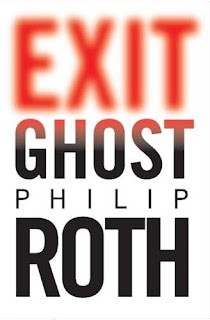Exit Ghost

It has taken me two inexplicable years to get around to reading Exit Ghost, by Philip Roth, my favorite novelist. It is the ninth, and supposedly last, of his novels about his literary alter-ego, Nathan Zuckerman, and I have now read them all. It is a sterling piece of fiction.
The previous three Zuckerman books--American Pastoral, I Married a Communist, and The Human Stain--featured Zuckerman as a supporting player and observer of the tragedy of someone else. In Exit Ghost he returns to front and center. He is now 71, living in a hermit-like existence in a cabin in western Massachusetts. He is virtually cut off from the outside world, as he doesn't watch TV, read newspapers, or own a computer.
A urological condition compels him to return to New York City (he is incontinent, as well as impotent, from a bout of prostate cancer). He has not been in the city in eleven years, chased away by death threats, and likens himself to Rip Van Winkle upon returning. He is most amazed by the prevalent use of cell phones: "Every where I walked, somebody was on the phone. Inside the cars, the driver was on the phone. When I took a taxi, the cabbie was on the phone. For one who frequently went without talking to anyone for days at a time, I had to wonder what that had previously held them up had collapsed in people to make incessant talking into a telephone preferable to walking about under no one's surveillance, momentarily solitary, assimilating the streets through one's animal senses and thinking the myriad thoughts that the activities of a city inspire."
A chance sighting of a person from his past changes things. She is Amy Bellette, and was a character in the first Zuckerman book, The Ghost Writer. She was the student and mistress of Zuckerman's literary idol, E.I. Lonoff. In the current book she is 75 and a sufferer of a brain tumor. Jogged by the memory, Zuckerman impulsively answers an ad by a couple looking to swap their New York apartment for a rural New England retreat. When he meets the couple, he is smitten by the wife, a thirty-year old woman. Then a writer who is doing a biography of Lonoff tracks him down (he is the wife's old boyfriend) and Zuckerman is repulsed. He determines not to cooperate with what he finds to be a literary graverobber and even plans to do anything he can do to stop him.
There are many familiar themes that Roth recycles for this book, primarily the decrepitude of old age as one slides towards death. Roth, the same age as Zuckerman, has been examining mortality a lot lately--his recent novels Everyman, The Dying Animal, and Indignation have all featured characters facing or succumbing to the grim reaper. In addition, Zuckerman is suffering from some embarrassing maladies--he goes to a urologist so he can control his bladder, and not have to wear Depends. This, coupled with his impotence, make him feel less of a man (he is not in control of his penis). As the book goes on he, along with the reader, realizes he is also losing his memory, and he becomes an unreliable narrator.
There is also a political bent to the book. In a way, this is Roth's 9/11 book. Jamie, the young wife, is fleeing the city because of the fear of another terrorist attack. A pivotal scene takes place on the night of the 2004 election, in which he is invited to watch the election returns with the young couple. They are committed liberals, and their optimism is dashed as the results go sour. Roth, through the character of Billy, the young man, sums George W. Bush up from a quote from MacBeth: "A wayward son, spiteful and wrathful." Roth is a well-known liberal and allows Zuckerman to sum up the last generation or so of presidential politics: "I had campaigned for Stevenson as a college student and had my juvenile expectations dismantled when Eisenhower trounced him, first in '52 and then again in '56; and I could not believe what I saw when a creature so rooted in his ruthless pathology, so transparently fraudulent and malicious as Nixon, defeated Humphrey in '68, and when, in the eighties, a self-assured knucklehead whose unsurpassable hollowness and hackneyed sentiments and absolute blindness to every historical complexity became the object of national worship and, esteemed as a 'great communicator' no less, won each of his two terms in a landslide." Zuckerman's solution to this is to stop following politics.
Then there is the older man/younger woman trope. To his credit, Roth does not consummate the attraction, instead Zuckerman pines for Jamie, is politely rebuffed, and repairs to his hotel room to write a dialogue of fantasy. While it is poignant, it can stretch into a kind of pathetic neediness, and bears similarities to the recent films of Woody Allen.
This book has a lot of anger. Roth, who has been the subject of biography, vents a lot of spleen at biographers, who dredge up secrets in the interest of exalting their subjects. Zuckerman is a man who lives in a previous era, and perhaps has outlived his time, hanging on past his expiration date, pissing his pants and smelling like death. But then, toward the end of the book, Roth is uncharacteristically sentimental when he writes a tribute to George Plimpton. It's a strange interlude, but I would imagine Plimpton would have been thrilled to read it.
Roth does not kill off Zuckerman, but as he drives back to his solitude in Massachusetts we can be confident he is "crawling into my hole to die." Taken as a whole, the nine books about Zuckerman may be the greatest series of books involving one character in all of American letters.


Comments
Post a Comment